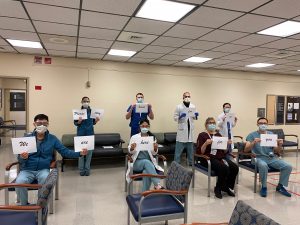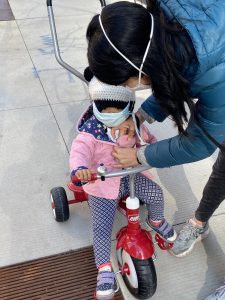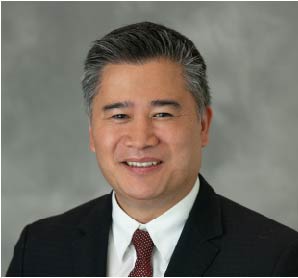RetinaLink’s Staying the Course is honored to feature RV Paul Chan, MD, MSc, MBA. Dr. Chan has several important roles at the Illinois Eye and Ear Infirmary at the University of Illinois at Chicago (UIC), Chicago, IL. He is the new Chair of the Department of Ophthalmology & Visual Sciences and also serves as the Director, Pediatric Retina & ROP Service and Co-Director, Vitreoretinal Fellowship. Dr. Chan shares how the COVID-19 pandemic has presented new challenges and opportunities across all areas in the Department of Ophthalmology and Visual Sciences at UIC.
“We are all in this together.” The COVID-19 pandemic has had a profound effect on all of us, our families, and the patients who we care for. We are still “sheltering at home” and in Illinois we’ve seen approximately 50,000 confirmed cases and 2,200 deaths related to COVID-19.
Since early March I’ve been keeping a daily journal on everything we’ve been doing to respond to the pandemic. I’ve found incredible value in drawing upon the experience and wisdom of everyone. I’ve reached out to other US Ophthalmology Chairs and my friends from Asia, Latin America, and other regions of the world. Guidance from Dr. David Parke and the American Academy of Ophthalmology (AAO) has also been invaluable, and my good friends from the Vit-Buckle Society (VBS) have been sharing information about their experiences on a daily basis. There’s no playbook here and I don’t think anyone has seen anything like this before. It’s been very important to LISTEN, collect data, and make collaborative decisions that are best for the Department.
RetinaLink (RL): As the new Chairman of Ophthalmology at the University of Illinois in Chicago, what steps and organizational changes have you made during the COVID-19 pandemic?
R.V. Paul Chan, MD, MSc, MBA (RVPC): I consider the Department to be an extension of my family with the core mission right now to provide SAFETY to our patients and healthcare providers – we must stay safe and keep moving forward. Communication is critical. It has been important for me to be available, responsive and transparent. We have an outstanding administrative team and immediately we established daily meetings to ensure that all stakeholders have an opportunity to provide feedback and concerns. We also send out regular email updates to make sure everyone is informed. The situation allowed us to have the opportunity to review our organizational structure and develop protocols outlining PPE use, clinical workflow, telehealth, and triage, etc. These protocols ensured we had structure around our response and potentially prepare us for what may be a second wave of COVID-19 cases that could happen later this year. When you’re faced with challenges and need to pivot, you recognize this and adjust.
RL: What decrease in patients have you seen in your clinic and operating room.
RVPC: Our outpatient clinic volume is down 85% and our surgical volume has been about 10% of normal. We are now planning a transition to improve access to patients that we had to reschedule two months ago. I think many practices around the country are facing the issue of the previously non-urgent patients now requiring a visit. The key is transitioning safely and every step requires close monitoring to address any potential issues.

UIC Ophthalmology trainees & staff
RL: Please discuss empowering your Faculty.
RVPC: I’m incredibly grateful to all of the Faculty for their leadership and invaluable contributions to every aspect of our Department: from enhancing our educational activities with web-based programs and surgical wet labs, to improving our clinical services with telemedicine, new clinical workflows, and staff education. From a research perspective, there has been an increase in both manuscript and grant submissions, and new COVID-19 related research projects have been proposed. I’ve learned a significant amount from each member of our Faculty and we have already initiated a number of programs that have provided opportunities for us in the future.
It’s incredibly important to listen to everyone’s concerns and ideas, and try to understand their perspective. Each member of the team can contribute in an impactful way. For example, our oculoplastics fellow developed our Department’s COVID Corner which is a daily report summarizing important updates. One of our junior faculty members has a passion for telemedicine so she and our COVID-19 Telemedicine Task Force created and implemented our COVID-19 triage and telemedicine program. This was critical in providing a safer environment for our patients and healthcare providers. We have been learning through every step and finding better ways to manage our clinical practice, which is a huge win.
And, Yannek I. Leiderman, MD, PhD, who is on the Retina Faculty and Co-Director of the ORBITlab, has been leading efforts with UI Health and UIC to develop much needed PPE, including face shields and masks.
I work with a remarkable team and true character comes out during a crisis. I frequently find myself saying: “we will do this together and will get through it together.” It’s been amazing to see everyone come together during this time. I feel very fortunate to serve such a collaborative Department and Faculty.
RL: How are your Residents and Fellows?
RVPC: Our Residents and Fellows have been amazing through a very challenging time. We have 30 clinical trainees and they have been on the frontline since the beginning of this COVID-19 pandemic. I’ve been impressed to see our Residents and Fellows come up with very creative ideas in managing our patients safely and working with our Faculty on educational initiatives. There’s been uncertainty around surgical numbers and clinical education, and for our graduating trainees, this is an important time for them surgically. A primary goal of our Department’s response to COVID-19 includes trying to fill any gaps in education and there have been a number of challenges. Similar to what most programs are facing, the past two months have seen a decrease in surgical volume. However, when looking at the opportunities, we are maximizing our web-based programs for lectures, grand rounds, meetings, and other educational activities. I often reflect back to when I was a resident at Cornell in New York and managing the issues when 9/11 happened. We learned how to manage through a crisis and learned to appreciate the importance of working as a team.
RL: When will you decide to travel again?
RVPC: I usually travel about 200,000 miles a year for my academic work and my service as the Secretary for Global Alliances for the AAO. I think it will be quite some time before we will feel completely confident to travel freely. We need protection before that confidence returns. Optimally, we have to have antibody testing and a vaccine. However, we’ve all learned to connect, through technology, with our global partners. We can continue our work using video conferencing and like telemedicine, I think tele-education is the future and will be here to stay.
RL: What are you doing to decompress at the end of your busy day?
RVPC: My family is the most important part of my life. Undoubtedly, the time I have with my family will be the biggest positive result coming out of this. We make it a priority to be together and now that our daughter is almost 3, she definitely has her own (very strong) opinion.

Dr. Chan’s daughter wearing her
face mask
So whether I like it or not we find ourselves doing a lot of activities with a Frozen theme e.g. music from the movie Frozen and even Frozen Yoga. Since we’re trying to maintain social distancing, for exercise we routinely walk up 29 flights of stairs in our building.
Dr. RV Paul Chan can be reached via e-mail – [email protected]

